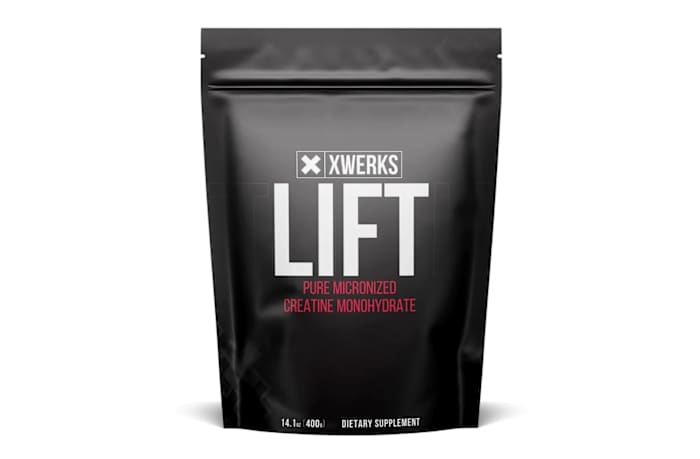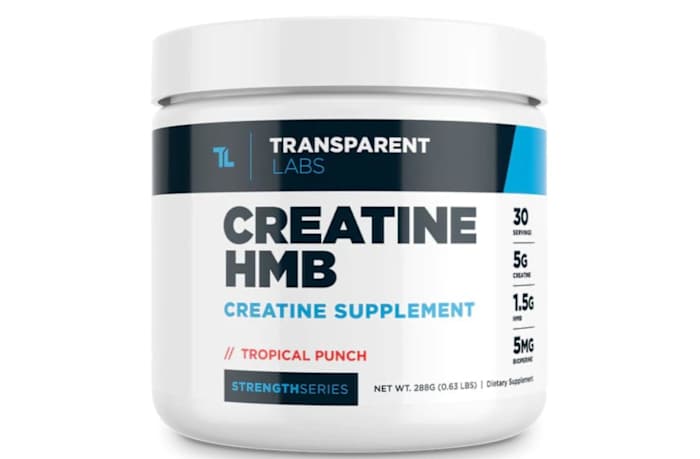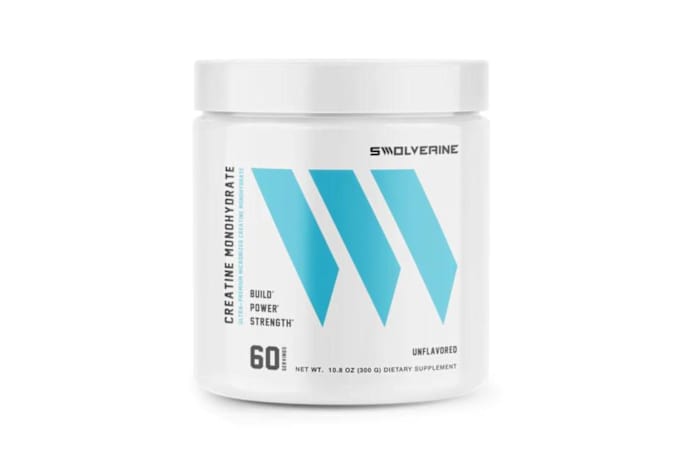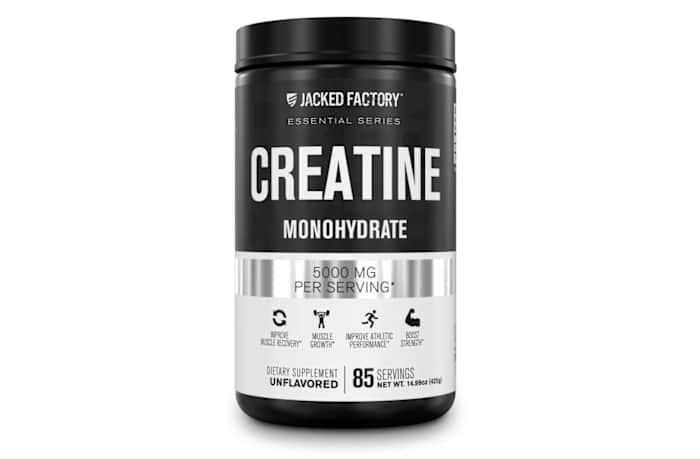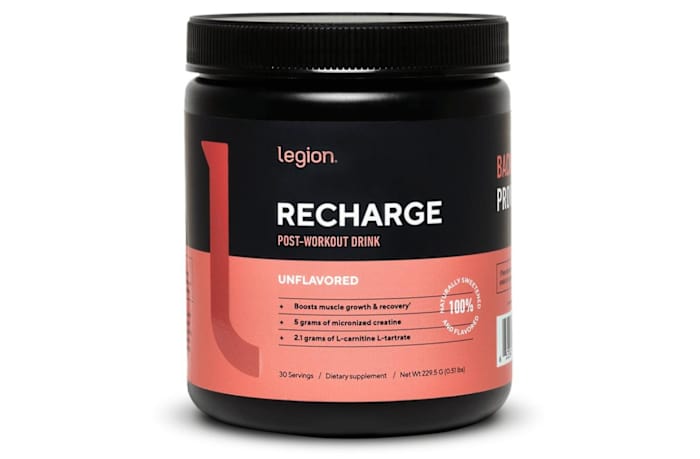The products featured in this article have been independently reviewed. When you buy something through the retail links on this page, we may earn commission at no cost to you, the reader. Sports Illustrated editorial staff are not involved in the creation of this content. Learn more here.
In terms of sports supplements, there are few products that have garnered as much attention and research as creatine. Renowned for its potential to enhance athletic performance, improve overall exercise capacity and support lean muscle mass, creatine has become a staple supplement for athletes and fitness enthusiasts alike. What’s even more interesting is that emerging research seems to suggest that creatine is also helpful for improving cognitive function, especially in terms of aging and stressed individuals.
While most gym goers are familiar with the tried and true classic, creatine monohydrate, innovative supplement companies are always attempting to redefine the rules and create the next big thing. This has led to additional forms of creatine flooding the market such as micronized creatine, creatine hydrochloride, creatine nitrate and creatine ethyl ester to name a few.
In this article, we'll explore these different forms of creatine, discuss their potential benefits, provide insightful usage tips and analyze what the scientific literature has to say. Whether you’re a seasoned athlete or someone simply looking to enhance your workout gains, this article will help you learn everything you need to know about the different types of creatine.
What Is Creatine?
Creatine is a molecule that’s made up of three amino acids—arginine, glycine and methionine—and it plays a critical role in the production and storage of energy within the body. It’s particularly useful during high-intensity, short-duration activities like weightlifting and sprinting because of its ability to replenish the body’s energy currency, adenosine triphosphate (ATP). ATP provides the energy the body needs for exercise; however, ATP stores are rapidly depleted during intense physical activity. Creatine helps restore these ATP levels quickly, allowing muscles to perform at higher intensities for longer periods of time.
Related Post: The Best Time to Take Creatine for the Best Results
While our bodies are able to manufacture some creatine via the kidneys, liver and pancreas, it can also be consumed through dietary sources such as seafood, red meat or supplementation. Creatine supplements are typically found in a powdered form and can be mixed with water or another beverage of your choice. Daily supplementation is usually the best route to ensure optimal saturation of the muscles, which can lead to improved exercise performance, increased strength and enhanced recovery.
Due to its role in improving exercise performance, creatine has gained popularity as a dietary supplement among athletes and fitness enthusiasts alike. That being said, it’s recommended to consult with a healthcare professional before beginning a creatine supplementation routine, especially if you have any underlying health conditions or are taking any other medications.
Benefits of Creatine
Supplementation with creatine has been studied extensively, and is believed to offer a number of potential benefits for individuals who participate in high-intensity activities like strength training and most competitive sports. Here are some of the most well-documented benefits of consistent creatine supplementation.
Enhanced exercise performance
Supplementation with creatine has consistently been shown to enhance the production of ATP, the body’s main currency for short bouts of intense physical activity. This means that creatine is particularly effective in improving exercise performance in sports that involve sprinting, jumping or maximal effort lifts. This is a major reason why athletes that compete in Olympic weightlifting, swimming, cycling and track and field should consider the use of a creatine-containing supplement on a daily basis.
Improved muscle recovery
Research suggests that creatine supplementation can lead to greater gains in muscle mass over time, particularly when combined with well-designed resistance training protocols. For example, creatine may help to reduce muscle damage and inflammation, leading to quicker recovery times after intense exercise. Therefore, supplementation with creatine can be particularly beneficial for individuals who engage in frequent training sessions and need to optimize their recovery protocols.
Improved hydration
Creatine supplementation has been shown to draw water into the muscle cells, leading to increased cell volume and improved hydration. While this can lead to some short-term weight gain through water retention and bloating, these side effects typically subside within the first week or two, and can contribute to the appearance of fuller muscles.
Enhanced cognition
Supplementation with creatine may provide cognitive benefits, especially in older adults. A 2023 meta-analysis of creatine supplementation found that daily creatine intake did enhance memory performance in healthy individuals.
Which Creatine Type Is Best for you?
Creatine monohydrate
Creatine monohydrate is the most well-studied form of creatine in the scientific literature. This is because it has a proven track record of enhancing athletic performance, promoting lean muscle growth and improving overall exercise capacity. Creatine monohydrate is also one of the most cost-effective versions of creatine supplementation, and it's generally safe for healthy individuals when used as directed. A typical creatine monohydrate dose is between three and five grams per day, and the latest research shows that you don't need a loading phase, so you can start taking this amount from day one.
Related Post: Creatine Loading Phase: What Is It, and Is It Necessary?
Micronized creatine monohydrate
Micronized creatine monohydrate is a specific form of creatine monohydrate that has undergone a process that involves reducing the particle size of the creatine monohydrate crystals into a fine powder. This may improve the solubility of the creatine powder when mixing it in water or your beverage of choice. However, while it may dissolve more easily in liquids, micronized creatine monohydrate has not been found to improve the actual effectiveness in terms of muscle growth and performance over standard creatine monohydrate. Therefore, the main benefit of micronization is related to the convenience and overall ease of use. Both micronized and standard creatine monohydrate follow the same dosage protocol of around three to five grams taken daily.
Buffered creatine
Buffered creatine, also known as kre-alkalyn, is a form of creatine that has been pH buffered to make it less acidic. The goal of this buffering process is to improve the stability of the creatine and reduce its conversion to creatinine within the body. While the concept of buffered creatine is intriguing, scientific research comparing its effectiveness to regular creatine monohydrate is somewhat limited and inconsistent. There have been claims made by supplement manufacturers that kre-alkalyn may reduce bloating or stomach discomfort; however, the scientific literature has found no significant differences between buffered creatine and creatine monohydrate in terms of side effects, athletic performance or lean muscle mass. Buffered creatine products are often more expensive than regular creatine monohydrate, so it's up to the consumer to decide if they want to spend the extra money for a potentially slightly superior product. The recommended dosage level for buffered creatine is often lower than that of regular creatine monohydrate due to the claims of improved absorption and stability. However, research supporting these lower dosages is limited, and many experts suggest that dosages are similar to those of regular creatine monohydrate.
Liquid creatine
Creatine is stable in its solid crystal form, but not in liquid. For example, research shows that creatine is not stable in liquid solution and overtime it will convert into creatinine, a chemical waste product of creatine consumption. That being said, the degradation of creatine into creatinine can be halted by lowering the pH of the solution under 2.5. This is the reason that less than one percent of creatine is degraded into creatinine during the digestive process in the body. This lack of stability of creatine in solution is a major reason why creatine is primarily marketed in the powdered form and there haven’t been many successful liquid creatine supplements to hit the market.
Creatine ethyl ester
Creatine ethyl ester is a modified form of creatine that has been chemically altered in order to improve its absorption by the body. The idea behind creatine ethyl ester was to enhance the bioavailability of creatine, potentially allowing for lower dosages, which may reduce water retention compared to traditional creatine monohydrate. Unfortunately, the scientific data does not support the claims that creatine ethyl ester provides any additional benefits in terms of muscular strength or performance when compared to creatine monohydrate.
Our Favorite Products for Optimal Creatine Supplementation
XWerks Lift Creatine
XWerks Lift is a micronized creatine monohydrate supplement that’s both simple and effective. As stated above, micronized creatine does reduce the chance of clumping and slightly improves how well the supplement dissolves in water. XWerks Lift is also flavorless, allowing you to mix it easily into your favorite beverage, as well as alleviating the need for XWerks to use any artificial colors, flavors or sweeteners in their product. Each bag of XWerks Lift costs $49.00 and contains 80 servings, which equates to almost a three-month supply.
Transparent Labs Creatine HMB
Transparent Labs Creatine HMB is one of my personal favorite creatine supplements on the market. The ingredient list includes five grams of creatine monohydrate, 1,500 milligrams of beta-hydroxy-methylbutyrate (HMB), 500 IUs of vitamin D and five milligrams of BioPerine black pepper extract, making it a well-rounded sports supplement. The HMB in particular is an excellent complement to the creatine as it has been studied for its potential benefits in protecting and building lean muscle mass. In terms of taste, Transparent Labs’ Creatine HMB comes in 11 different flavors, including flavorless, while still staying true to the company's key tenets of never containing any artificial flavors, colors, sweeteners or preservatives. The only potential downside is that this supplement is slightly more expensive than other creatine supplements on the market, priced at $49.99 for a 30-serving supply.
Swolverine Creatine Monohydrate
Swolverine’s creatine supplement is a single-ingredient formula that contains 5,000 milligrams of creatine monohydrate per serving. This flavorless product is about as simple as it gets, and it's vegan, gluten-free and free from artificial ingredients. From the consumer reviews on the Swolverine website, this supplement dissolves easily in water. Each container of Swolverine Creatine Monohydrate comes with a 60-serving supply.
Jacked Factory Creatine
Similar to Swolverine, Jacked Factory’s Essential Series creatine monohydrate supplement is a single-ingredient, creatine monohydrate-only formula. What makes this product so appealing is the budget-friendly price point: $31.49 for the 85-serving supply (five grams per serving). Despite the affordable price point, Jacked Factory’s creatine monohydrate is still a high-quality supplement that's free from artificial ingredients, fillers or preservatives, and is made in a cGMP-certified, FDA-registered facility right here in the U.S. to ensure its quality.
Legion Athletics Recharge
Legion Athletics’ Recharge is a post-workout sports supplement that contains five grams of micronized creatine monohydrate, 2.1 grams of L-carnitine L-tartrate and 10.5 milligrams of corosolic acid. This is a solid option if you're looking for a flavored post-workout product that still contains an effective dose of creatine and other potentially beneficial ingredients aimed at recovery. It's 100 percent naturally sweetened and available in five different flavors, including Sour Candy, Strawberry Lemonade, Watermelon, Fruit Punch and Unflavored. The price for a 30-day supply of Recharge post-workout is $39.99.
Types of Creatine FAQs
How much creatine should I take?
For most individuals, an effective dose of creatine is around 0.03 grams per kilogram of bodyweight per day. The best way to calculate this amount of creatine is by taking your bodyweight in pounds and dividing it by 2.2 to convert it into kilograms. Multiply that number by 0.03, and that will guide you towards determining an effective dose. For example, a 200-pound individual would require around 2.7 grams of creatine per day to be considered an effective dose.
Which type of creatine is best for muscle growth?
Among the various forms of creatine that are available, creatine monohydrate is widely regarded as the most effective and well-studied option to promote the potential performance-enhancing benefits. Creatine monohydrate has been extensively studied in the scientific literature, and has consistently been shown to enhance strength and power and promote lean muscle growth.
Does it matter which creatine I get?
Yes, the type of creatine you choose can impact a variety of factors such as the price, absorption, potential side effects and overall effectiveness of the supplement. If you’re looking for a cost-effective option that has a strong track record of efficacy, then creatine monohydrate is generally considered to be the most well-studied and reliable form of creatine. That being said, you should use this article along with your own research to determine which product will best suit your specific needs.
Which creatine works the fastest?
Among the various forms of creatine, creatine monohydrate is generally regarded to be the most effective since 99 percent of creatine monohydrate is absorbed into the blood and shuttled to the muscles or excreted as urine. It’s also important to note that the concept of one form of creatine working significantly faster than another is not widely supported by current scientific research. Claims of increased rates of absorption from certain forms of creatine such as creatine hydrochloride or creatine ethyl ester have been made by manufacturers. However, the scientific evidence to support these claims is often lacking or inconsistent.
Final Thoughts
If you’re looking for a form of creatine that is inexpensive, effective and well-supported by the current scientific literature, then creatine monohydrate is a logical and reliable choice. However, there are other forms of creatine, such as kre-alkalyn and creatine ethyl ester that are marketed as being superior or having faster effects, but these creatine derivatives just don’t have the same level of scientific backing as creatine monohydrate. While I encourage you to do your own research and test out which products might work best for you, it’s hard to argue with the tried and true benefits of a simple creatine monohydrate.
Prices are accurate and items in stock as of publish time.

